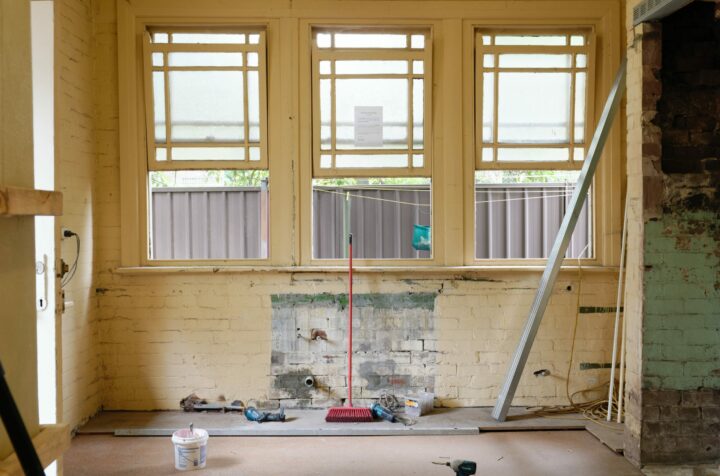The following contribution is from another author.
How long did it take for you to get your home looking the way you wanted it? Depending on how it looked before, the number of changes you wanted to make, and your budget, it could be anything from a few weeks to a lot of years – and now you’re finally at a stage where your home looks and feels just right.
It was a hard and challenging journey, wasn’t it? Whether you did all the work yourself, got some help, or hired a professional to do everything, the planning and the disruption alone would have been stressful, not to mention the work involved.
So the last thing you’ll want is to find that your home starts to look less than perfect again. You spent time, money, and effort getting the whole thing right, but it’s crucial to know that it will take time and effort, at least, to keep it looking that way.
Don’t worry, though; once you get into the habit of really taking care of your home after it’s been renovated, the job won’t seem so daunting anymore (plus, the results will speak for themselves, helping you see why it’s just so important). With that in mind, here are some useful tips to ensure you keep your home looking great. Read on to find out more.
Create A Maintenance Schedule
Once the dust has (literally) settled and your home is how you want it after the excitement of all the changes the renovation brought about, it’s important to come up with a maintenance and cleaning schedule sooner rather than later.
The best thing to do is to divide the tasks up into monthly, weekly, and perhaps even daily jobs so that you don’t get overwhelmed by thinking you have to do it all at once, but also that nothing gets missed.
Daily tasks could include quick spot cleaning, checking that your appliances are turned off, and generally inspecting for any issues, no matter how small they might be (remember, the earlier you deal with small problems, the easier they are to fix and the less disruption and cost they’ll cause).
On a weekly basis, you can focus on more thorough cleaning, check for water leaks (always an important thing to do because water can cause a lot of damage and lead to mold), and check high-traffic areas for signs of wear and tear – these are the areas that will look used much more quickly than others, so you’ll want to keep up with them and ensure you fix issues promptly.
Monthly tasks will be things like more in-depth inspections of appliances, testing your smoke detectors, and making repairs.
You can also schedule annual professional inspections for various things, including HVAC systems, electrical components, and your roof, for example.
Protect Newly Installed Surfaces
Newly renovated homes are going to have plenty of pristine-looking surfaces, like freshly painted walls, polished floors, perhaps even custom countertops, and so on. You’ll want to do what you can to keep these surfaces looking great and protect them as much as possible, otherwise the entire look of your home will start to fade.
For your floors, it’s wise to look into the dos and don’ts of maintenance, especially for wooden floors that do need some specific care. Knowing what you should and shouldn’t be doing will help you avoid making mistakes and ruining your flooring by accident. Although you might not like the idea of covering your lovely new floors, another good idea is to add a rug or runner to high-traffic areas, as that’s going to minimize the wear and tear on those newly finished floors.
Your furniture can also cause damage to your floors, so that’s another area to look at. If you’re worried that heavy furniture is going to cause scratches or even dents in your floors, invest in some furniture pads that go under the legs of a piece of furniture (or even the entire thing if need be). These don’t cost much, but they can really help when it comes to reducing damage.
For your painted walls, look for gentle, non-abrasive cleaning solutions (or make your own so you can be sure of the ingredients and know they’re not going to cause any damage) and a soft microfiber cloth, as that will keep the colors stronger and not cause any parts to be accidentally washed away.
If you don’t want to be stressed all the time and worried about your surfaces, and if you don’t want to be the only one taking care of them, talk to the other people in your household. Explain how important it is that these parts of your home are cared for and give people the information they need to do it – in that way, everyone can help out, and you’ll be less stressed as a result (and able to enjoy your renovated home much more).
Regular Cleaning And Decluttering
Regular cleaning is a major part of keeping your newly renovated space looking fresh and lovely, as we’ve briefly discussed how creating a cleaning and maintenance schedule can ensure that happens. Not only will cleaning on a regular basis help to keep your home looking great, but another benefit is that will make you feel great too – a clean home really can work wonders when it comes to mental health, and you’ll be able to relax more and feel less stressed. On top of that, a clean home is also good for your physical health; there will be less dust to breathe in, less chance of mold growing, and fewer nasty bacteria and germs all over the place, making you sick.
Of course, if you’re very busy or you want to be able to enjoy your free time doing anything other than cleaning, you could think about hiring a cleaner to help you keep your home looking good. Some people prefer this option as they know the work’s being done to a high standard (better than they could do), so the money they spend is worth it.
When you’re choosing cleaning products, make sure you pick ones that are specifically recommended for the surfaces in your home – different materials need different care, and using the wrong cleaners can result in some potentially major damage. Your cleaning schedule needs to fit your lifestyle otherwise you’ll soon find it’s too hard to maintain, so think carefully about the time you have and go from there. Some people might be able to do fifteen minutes of cleaning a day, and others might find it better to do two hours once a week, for example.
So it’s clear that regular cleaning is a big part of taking care of your home, but what about decluttering? Well, the fact is, decluttering can help too.
When you reduce the amount of ‘stuff’ in your home, the entire place will look a lot more organized and be a more pleasant space to spend time in. That combined with the new decor and any other changes you’ve made will mean you can really appreciate your home and how it looks and feels.
The problem is that over time, we tend to collect more and more stuff, and our homes can become cluttered again – possibly without us even noticing. That’s why it’s wise to declutter on a regular basis, so you clear things out before it gets too bad.
Pest Control
Pests can cause untold damage in a home, so you’re definitely not going to want to have them in your lovely new place when it’s been freshly decorated. The good news is that having a well-maintained home is the first step when it comes to reducing the risk of pests invading, so by carrying out the things we’ve mentioned already you’re helping hugely.
Other things you’ll need to do include storing your food properly, disposing of waste quickly, and possibly getting a pest control expert to visit your home on an annual basis to check things out for you and ensure there’s nothing going on that you don’t know about (pests can be pretty sneaky, and sometimes you might not know there’s a problem until you actually see the results, at which point, the damage has already been done).
On top of all this, make sure you seal the gaps around your windows, doors, and any other entry points, and keep your outdoor spaces well-maintained, as that means fewer hiding places for pests.
Final Thoughts
Taking care of your home after it’s been newly renovated is a commitment, but it’s one that’s sure to pay off in the end when your home looks great for longer, and you don’t have to make any potentially costly repairs – everything will last for longer, saving you money.
It might feel like hard work, but the sooner you roll up your sleeves and get stuck in, the better your home will look and the longer those new renovations will last – it’s well worth the effort, and your home will be a source of pride and comfort for many years to come.

















Really Good Blog That Proved Guidance to me!!